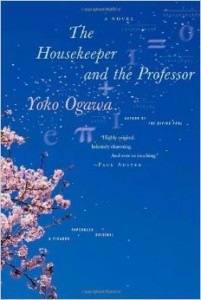
This is a lovely slice-of-life tale involving a housekeeper in contemporary Japan who works for an eccentric and brilliant old mathematician who, because of a brain injury, has a working short-term memory of only 80 minutes. She and her preteen son who accompanies her to his cottage are drawn to the old man’s kindness and brilliance.
Because of his enthusiasm for numbers, they become interested in number theory, primes, Euler, Fermat, and various number games. He is delighted with their efforts and friendships are formed. Another subtheme is the old man’s obsession with baseball. Though he remembers only classic playoffs from twenty years ago, he shares with the young boy an enthusiasm for the game. Eventually the old man dies and the housekeeper and her son move on.
The main attraction of the story is the question of how a friendship can occur with someone who only has a memory span of 80 minutes. The housekeeper pins a drawing of herself to the old man’s suit so he can recognize who she is each day. How would that work in a relationship? It does work, at least as the tale is told from the housekeeper’s POV, and that is the main achievement of the novella. Just being in the immediate presence of each other is sufficient for friendship, perhaps all that friendship really is.
The mathematics theme is mildly interesting if idiosyncratic. I do not suffer from number phobia as so many Americans do, so I found the light digressions into math interesting. Narratively, they served as a ground of discourse through which the housekeeper and her son could quickly and repeatedly renew their friendship with the professor each day. The baseball theme served a similar purpose, though that was less convincing and less interesting, I thought.
There is a bit of slippage on the 80-minute memory theme, as the professor often seems to remember more than he should, but it’s a literary device, not a neurological fact. None of the characters has names, so the story may be a metaphor for caregivers who deal with Alzheimer’s and other dementias.
Also compelling is the glimpse into ordinary Japanese life and character, which will be fascinating for any Westerner who has lived there. The quiet patience, thoughtfulness, and self-discipline of the characters are well-drawn and will be recognized by anyone familiar with contemporary Japanese fiction and poetry.
The language of this little tale is graceful and uplifting, a tribute to the translator’s skill. The book is like a poignant haiku in novella form.
Ogawa, Yoko (2003/2009). The Housekeeper and the Professor. Stephen Snyder, Translator. New York: Picador. (180 pp).
